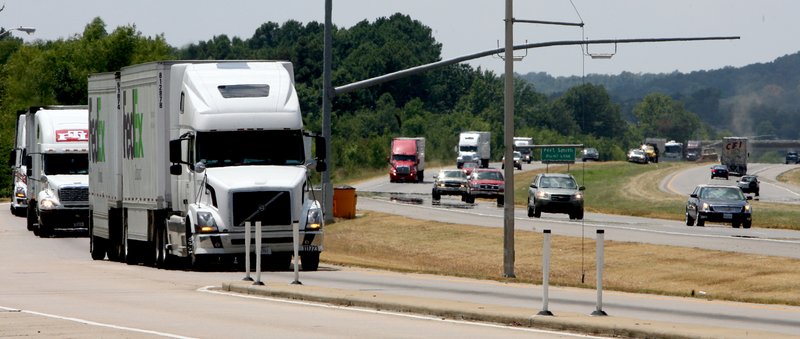In what has been a cat-and-mouse game played out on highways across the country, long-distance truckers often are suspected by state authorities of taking detours to bypass weigh stations.
Highway and law enforcement officials try to stem the practice by using portable scales and spot-checks on alternate routes to nab drivers trying to evade checks on their loads and their driver's log. But those are low-tech, man-hour-intensive methods that net mixed results.
In Arkansas, though, the cat is about to go high-tech.
The Arkansas Highway and Transportation Department received bids last week on its first "virtual weigh station," an unmanned set of computerized scales and cameras that can capture a range of information on big rigs and feed it to nearby patrol officers in an instant.
Last week, the department opened a low bid of $904,515 from Township Builders Inc. of Arkansas to install the virtual weigh station. If the bid withstands a department review and the company is awarded a contract, construction could begin within four to six weeks with the idea of beginning operation early next year, said Ronnie Burks, the department's chief of commercial truck enforcement.
The money comes from a grant the Federal Motor Carriers Safety Administration awarded the department, Burks said.
Another federal agency, the Federal Highway Administration, extols the technology, saying it has "the potential to fundamentally change the way truck size and weight standards and regulations are enforced in the United States."
The state's first virtual weigh station will be installed on U.S. 64 near Alma. The Highway Department suspects big trucks are avoiding its weigh station nearby on Interstate 40.
Burks said truckers could be avoiding the station for any number of reasons -- the hassle of a random truck inspection, the driver knows the truck is over the 80,000-pound limit for big rigs, or their haul includes contraband.
Joey Slaughter, a long-haul trucker from Virginia who goes through Arkansas from time to time, has a simpler explanation:
"They're just trying to avoid getting a ticket," he said, noting that minimal infractions can cost a driver $100 to $300.
Whatever the reason, the department is turning to sophisticated technology to steer trucks back to the interstate weigh station.
The virtual weigh station not only will weigh the vehicle, Burks said, it will record its Department of Transportation registration number and allow officers equipped with laptop computers to use the number to check databases for compliance with registration and insurance requirements, driver's hours of service and whether the company or the driver is operating the vehicle while under federal sanctions.
"It's a safety issue," he said.
The trucking industry has no problem with the technology. "We support any technology that will make our roads safer," said Shannon Newton, president of the Arkansas Trucking Association.
The weigh station works through plates that will be installed under the eastbound lanes of U.S. 64. When a truck passes over the plates, they will automatically measure not only the truck's total weight, but its weight on each axle and the spacing between the axles to help determine the truck's compliance with the federal bridge formula.
The federal bridge formula is based on a 1975 law designed to limit the weight-to-length ratio of a vehicle crossing a bridge. The law "states that two or more consecutive axles may not exceed the weight computed by the Bridge Formula even though single axles, tandem axles, and gross vehicle weights are within legal limits," according to the Federal Highway Administration.
The virtual weigh station also will automatically take a photograph of the vehicle, including its federal registration number. It is that information that will allow a Highway Police officer stationed east of the weigh station to make the compliance check and, if necessary, pull over the truck, Burks said.
An officer won't be assigned around the clock to the virtual weigh station, but truckers won't know when they will be there, he said.
Burks said the goal isn't to write more tickets. Instead, it is to ensure the big trucks on Arkansas roads are operating within the law.
"The goal is to get them back to the interstate weigh station," he said.
When the virtual weigh station technology was explained to him, Slaughter expressed worry that it would be used like "red-light cameras" or "speed cameras" in which jurisdictions set up cameras at key junctures to record motorists who run red lights or are speeding and mail them a ticket for the infraction later.
But Burks said violations caught by the virtual weigh station can only be enforced when the truck is pulled over and the officer confirms any violations. For instance, an enforcement action for a weight violation will only be done when the officer, using portable scales, confirms the truck was overweight, he said.
The department has no immediate plans to install the virtual weigh stations anywhere else in Arkansas, Burks said.
"But we have other bypass locations through out the state," he said. "If this system proves successful, I envision we could employ it at other locations depending on funding availability."
Truckers like Slaughter are resigned to it.
"I understand that's just the way our society is going, replacing people with technology," he said. "It's just progress. We have to get used to it."
Metro on 03/28/2016

